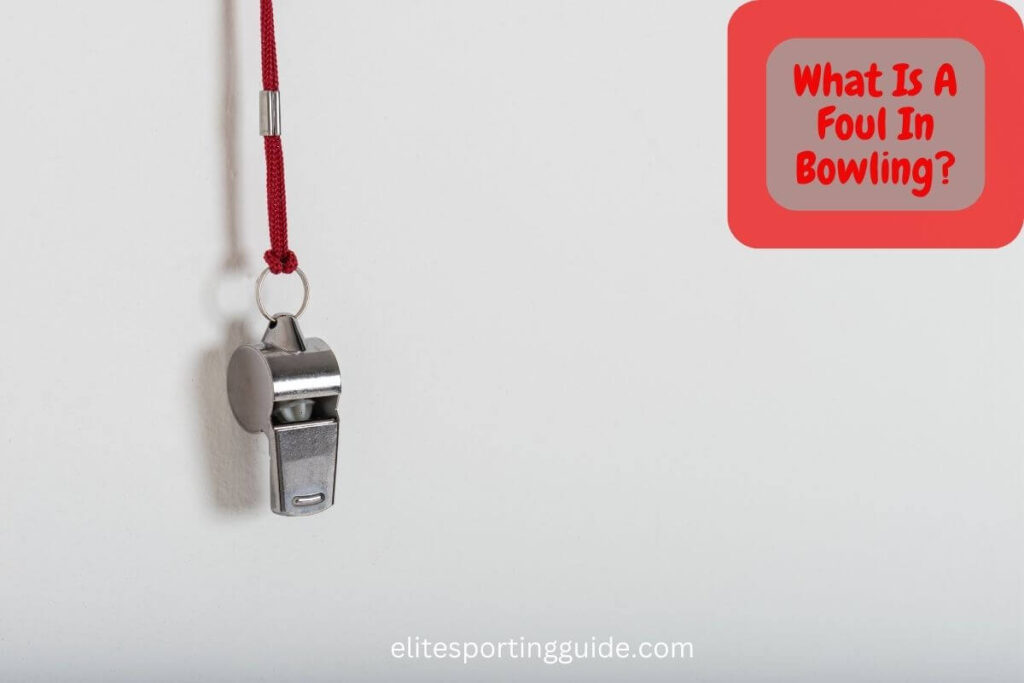Understanding the rules and terminologies is necessary to become a skilled player in the bowling world. One fundamental aspect of the game is comprehending what constitutes a “foul.”
In this informative article, we check out the concept of fouls in bowling, examining the various scenarios that can lead to a foul call and the consequences it carries for the bowler.
What Is A Foul In Bowling?
A foul in bowling occurs when any part of the bowler’s body, clothing, or equipment crosses or touches the foul line during their delivery. When a foul is committed, the shot becomes invalid, and any pins knocked down on that delivery do not count towards the player’s score.
Understanding the Foul Rule in Bowling
In the game of bowling, the foul rule is a fundamental aspect that every player must grasp to participate effectively.
The foul rule is straightforward: a bowler commits a foul when any part of their body, clothing, or equipment crosses or touches the foul line during their delivery.
The foul line is a designated boundary that separates the approach area from the lane.
When a foul occurs, the shot becomes invalid, and any pins knocked down on that delivery do not count towards the player’s score.
Foul violations can have consequences ranging from score deductions to potential disqualification in more severe cases.
Understanding the foul rule is significant for maintaining fair play, ensuring a level playing field, and upholding the integrity of the game.
It encourages bowlers to focus on their footwork, approach, and release, promoting proper technique and skill development.
Whether in recreational play or competitive tournaments, adherence to the foul rule is essential for a smooth and enjoyable bowling experience for all participants.
By mastering this fundamental aspect of the game, bowlers can confidently step up to the lane, knowing they are equipped to play with integrity and sportsmanship.
Types of Foul Violations Interference
In the game of bowling, foul violations can occur when a bowler fails to adhere to specific rules and regulations.
These violations can lead to penalties and impact the outcome of the game.
Here are the main types of foul violations in bowling:
1. Foot Faults: A foot fault occurs when the bowler steps over or beyond the foul line during their delivery.
The foul line marks the boundary between the approach area and the lane. Stepping over it before releasing the ball can result in a foul call.
2. Lane Crossing: Bowlers must stay within their designated lane during their approach and delivery.
Crossing over into an adjacent lane can lead to a foul, as it disrupts the flow of the game and poses safety risks to other bowlers.
3. Equipment Infractions: Bowling balls and other equipment must meet specific regulations set by the governing bodies.
Using illegal equipment or modifying the ball during a game can result in a foul.
4. Pinfall Interference: After releasing the ball, the bowler should not interfere with the pins or the pin deck in any way.
Touching the pins while they are still standing or moving the pin deck can lead to a foul call.
It’s important for bowlers to be aware of these foul violations and take necessary precautions to avoid them during their games.
Identifying Foul Calls

Identifying foul calls in bowling is central to maintain fair play and uphold the integrity of the game.
There are different methods used to detect foul violations, ensuring that bowlers adhere to the rules. Here are the primary ways to identify foul calls:
1. Automatic Detection Systems: Many modern bowling alleys are equipped with automatic foul detection systems.
These systems use sensors or cameras near the foul line to detect any foot faults.
If a bowler crosses or touches the foul line during their delivery, the system triggers an alert, and the foul is recorded.
2. Umpire and Official Judgment: In some cases, especially in professional or tournament play, an umpire or official may be present to oversee the game.
Their role is to closely monitor the bowlers and make judgment calls on foul violations. They observe the bowler’s delivery and footwork to identify any fouls that may occur.
3. Bowler’s Honesty: In recreational or casual settings where automatic detection systems or officials may not be present, bowlers are expected to be honest and self-regulate.
If a bowler realizes they committed a foul, they should admit it and adjust their approach accordingly.
It’s important for bowlers to respect the rules and maintain fair play. Identifying foul calls accurately ensures that each player has an equal opportunity to showcase their skills and compete on a level playing field.
Consequences of Foul Calls
Foul calls in bowling carry significant consequences, impacting both the individual bowler and the overall game.
Understanding these consequences is essential for players to be aware of the importance of avoiding foul violations.
Here are the main consequences of foul calls:
1. Nullified Shots and Scores: When a bowler commits a foul during their delivery, the shot is considered invalid, and any pins knocked down on that particular delivery do not count towards their score.
This can be particularly frustrating if the bowler had achieved a high pin count on that shot.
2. Score Deduction: In some cases, a foul call may lead to a score deduction or penalty. The exact penalty may vary depending on the specific league, tournament, or bowling center rules.
It could result in a certain number of pins being deducted from the player’s total score for that frame or even the entire game.
3. Impact on Team Scores: In team-based formats, foul calls can affect the team’s overall score.
If multiple team members commit fouls, it can result in a reduced team score, potentially affecting the team’s ranking or chances of winning the match.
4. Player Disqualification: In more severe cases of intentional or repeated foul violations, a player may be disqualified from the tournament or league play.
This can lead to further sanctions or penalties imposed by the bowling association or governing body.
Overall, foul calls serve as a pivotal aspect of maintaining fair play and integrity in the sport of bowling.
By being aware of the consequences, bowlers are encouraged to be more mindful of their approach, footwork, and equipment to avoid potential fouls and ensure a competitive and enjoyable game for all participants.
Preventing Foul Calls
Preventing foul calls in bowling is essential for maintaining fair play and maximizing your chances of success.
Here are some key tips to help you avoid foul violations during your games:
1. Proper Footwork and Approach: Pay close attention to your footwork during your approach to the foul line.
Practice a consistent and controlled stride to ensure that you don’t step over or touch the foul line while delivering the ball.
Work on your timing to achieve a smooth release without any awkward movements.
2. Know Your Limits: Be aware of your personal boundaries and the distance from the foul line.
If you find yourself consistently crossing the line, adjust your starting position or shorten your approach to avoid foul calls.
3. Maintain Lane Etiquette: Respect the space of neighboring lanes and be mindful of your surroundings. Avoid drifting or crossing over into other bowlers’ lanes during your approach or follow-through.
4. Check Your Equipment: Ensure that your bowling ball adheres to the rules and regulations set by the governing bodies.
Any illegal modifications or improper equipment may lead to foul calls and penalties.
5. Stay Focused and Concentrated: Maintain your focus on the game and your delivery. Distractions can lead to accidental foul violations. Take a moment to gather yourself before each shot and concentrate on your technique.
6. Practice Good Sportsmanship: Bowling is a sport that relies on honesty and integrity.
If you accidentally commit a foul, acknowledge it immediately to the relevant parties and adjust your approach accordingly.
7. Seek Feedback and Coaching: If you’re struggling with foul calls, consider seeking feedback from experienced bowlers or even hiring a coach.
They can observe your approach, footwork, and release, providing valuable insights to help you correct any issues.
8. Familiarize Yourself with Bowling Center Rules: Different bowling centers may have specific rules regarding fouls and their enforcement.
Make sure you are familiar with the rules of the center you’re playing in to avoid any inadvertent violations.
By incorporating these tips into your bowling routine, you can minimize the risk of foul calls and focus on improving your overall performance.
Common Foul Mistakes to Avoid
Avoiding foul mistakes is crucial to maintaining a fair and successful bowling game.
Here are some common foul mistakes that bowlers should be aware of and strive to avoid:
1. Failing to Correct Footwork: If you’re aware of footwork issues that lead to fouls, make a conscious effort to correct them.
Ignoring persistent foul mistakes can negatively impact your performance and score.
2. Ignoring Lane Etiquette: Disregarding lane courtesy and not respecting the space of neighboring bowlers may lead to foul violations.
Be considerate and maintain a proper distance from others on adjacent lanes.
3. Lack of Concentration: Foul mistakes can occur when bowlers lose focus during their approach or delivery.
Stay concentrated and focused on executing your shots with precision.
4. Not Checking Lane Conditions: Different lane conditions may require adjustments to your approach. Ignoring lane conditions and not adapting your technique can lead to unintentional foul calls.
9. Ignoring Foul Signals: Some bowling alleys may have visible foul signals, such as lights or buzzers, to indicate a foul.
Pay attention to these signals and adjust your approach if necessary.
10. Poor Sportsmanship: Intentional foul actions, such as stepping over the line to gain an advantage, demonstrate poor sportsmanship and can lead to disqualification and negative perceptions from other players.
By being mindful of these common foul mistakes and actively working to prevent them.
Post you may like: What Is A Frame In Bowling?
Frequently Asked Questions about Bowling Fouls

Q: What happens if I commit a foul in bowling? A: If you commit a foul in bowling, the shot is considered invalid, and any pins knocked down on that delivery do not count towards your score.
The consequences may vary depending on the league or tournament rules, and you may face penalties such as score deductions or even disqualification in more severe cases.
Q: How do automatic foul detection systems work in bowling alleys? A: Automatic foul detection systems use sensors or cameras positioned near the foul line to monitor bowlers’ footwork during their approach and delivery.
If a bowler steps over or touches the foul line, the system triggers an alert, and a foul is recorded. This technology helps enforce the rules and ensure fair play during games.
Q: Can foul calls be challenged or reviewed in professional bowling tournaments? A: In professional bowling tournaments, some foul calls may be subject to review or challenge.
However, the specific rules and procedures for challenging fouls may vary depending on the tournament or event’s regulations.
Q: What are the most common types of foul violations in bowling? A: The most common types of foul violations in bowling are foot faults (crossing or touching the foul line during delivery) and lane crossing (drifting into adjacent lanes during the approach or follow-through).
Equipment infractions and pinfall interference are also possible foul violations.
Q: Can foul calls impact the outcome of a bowling game or match? A: Yes, foul calls can significantly impact the outcome of a bowling game or match.
Foul calls can result in nullified shots, score deductions, or even disqualification, which may affect a player’s or team’s chances of winning.
Q: What should I do if I accidentally commit a foul? A: If you accidentally commit a foul, it’s essential to acknowledge it immediately.
Inform the relevant parties, such as the scorekeepers or your opponents, and adjust your approach to prevent further violations.
Q: How can I prevent foul calls in bowling? A: To prevent foul calls, focus on maintaining proper footwork and approach, be mindful of lane etiquette, check your equipment for compliance with rules, and practice good sportsmanship.
Seeking feedback from experienced bowlers or hiring a coach can also help you improve your technique and minimize the risk of fouls.
Q: Are there any exceptions to foul calls in bowling? A: Foul calls are generally straightforward and apply universally.
However, some tournaments or leagues may have specific exceptions or variations in their foul rules, so it’s essential to familiarize yourself with the rules of the specific event you’re participating in.
Post you may be interested in: What Should You Look At When Bowling?
Mastering the Rules for Success in Bowling.
Mastering the rules of bowling is a fundamental aspect of achieving success and excellence in the sport.
Understanding what constitutes a foul and taking the necessary precautions to prevent foul mistakes is essential for maintaining fair play and upholding the integrity of the game.
By honing proper footwork, adhering to lane etiquette, and using legal equipment, bowlers can avoid foul calls and maximize their scoring potential.
In addition to the technical aspects, mastering the rules also involves embracing good sportsmanship and honesty on the lanes.
Demonstrating respect for fellow bowlers and the game itself fosters a positive atmosphere, contributing to a more enjoyable and rewarding experience for everyone involved.
As bowlers gain a deeper understanding of the rules and sharpen their skills through practice and coaching, they become better equipped to navigate various lane conditions and adapt their strategies accordingly.
Avoiding foul mistakes and staying focused during critical moments can make all the difference between victory and defeat.
Ultimately, mastering the rules and playing with integrity not only elevates one’s individual performance but also fosters a sense of camaraderie and sportsmanship within the bowling community.
So, let’s embrace the spirit of fair competition, commit to continual improvement, and celebrate the joy of bowling as a sport that brings people together, one frame at a time.



